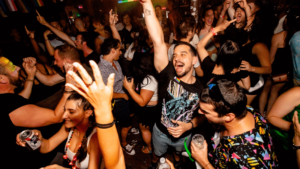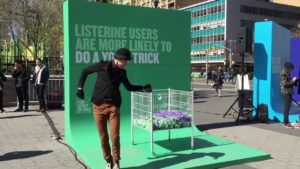In-person shopping offers customers something that online shopping can’t – a unique retail experience. And having retail space means you’re in the perfect position to remind people of what they’ve been missing.
Savvy retailers appreciate the importance of creating an immersive retail environment for their customers. In-store activities for a retailer – like demonstrating products, introducing new lines, or running classes – are an opportunity to engage with existing customers and attract new ones. In this guide to retail workshops, you’ll find ideas that’ll help get customers more invested in your brand.
Six reasons to host in-store workshops
One reason why people visit shops rather than buy online is human connection. We’re social animals who thrive on personal interactions and shared experiences. Retailers can use this to their advantage. The key is to find compelling ways to engage customers and entice others through your door.
1. Immerse attendees in a brand experience
In-store activities for retailers don’t need to mean a static display or demonstration. An in-store workshop is an opportunity for your customers to get hands-on and immerse themselves in the experience. For instance, if you run a flower shop or sell food, why not organise a workshop where customers can have a go at creating a floral display or making canapes?
Running a workshop that aligns with your customer’s interests makes good business sense. For example, a sportswear retailer could host a yoga session, or a bookshop owner could invite an author to run a creative writing session.
2. Engage potential new customers
For a retail business to thrive, it can’t simply depend on its loyal fanbase. You need to recruit new customers, too. Thinking about why existing customers visit your shop can help frame your approach.
If your shoppers are particularly eco-conscious, run a workshop on sustainability in retail. Or, if your customer base includes new parents, invite a local expert to demonstrate baby massage. Use special offers and freebies to encourage existing customers to bring their friends. Making it vibrant and fun is likely to attract curious onlookers.
3. Attract a new demographic
The broader the demographic you appeal to, the larger your customer base will be. A more diverse group of shoppers enables you to develop your product range and keep ahead of the competition.
Think about how you can appeal to shopping habits. For example, millennials are looking for personal experiences and the latest trends – anything they can share on social media is a plus. Craft and cooking workshops, such as making a macrame plant holder or handmade pasta, provide photo opportunities for their Instagram feeds. Meanwhile, for an older clientele, a technology masterclass or a talk on local history could be successful retail workshop ideas.
4. Demonstrate products
An in-store workshop can be a creative way to demonstrate your products. For instance, host an upcycling workshop using the tools and paint you sell. Or why not run a mending workshop where people can learn basic repair techniques? This could appeal to socially responsible millennials and people interested in sustainability.
Perhaps your products have a range of uses that aren’t immediately apparent. A creative workshop could explore the multipurpose use of baking powder as a cleaning agent, how to customise clothes using embroidery, or making planters from glass jars and tins.
5. Generate extra revenue
Workshops are a legitimate way to generate revenue, and people who pay upfront are more motivated to attend. Give incentives like Early Bird tickets and pre-purchase discount codes and stress that numbers are limited. There’s nothing like a fear of missing out to push ticket sales.
Complimentary or subsidised tickets for regular customers can encourage them to bring a friend. And offering free products, or making discounted products available at the workshop, enables you to charge more for a ticket.
6. Encourage loyalty
A loyal customer base is an asset to your business. Finding ways to reward regular customers maintains that loyalty. Why not host a VIP workshop exclusively for them? Or offer discounted tickets and special offers at ticketed workshops. Making them feel special is the best way to keep them onside.
Your customers want the personal touch. A makeup or skincare workshop could offer free consultations with an expert, or how about a fashion show with individual colour analysis and styling tips? And remember, make sure you ask loyal customers for feedback on your workshop. They’re the ones who know your business best.
Retail workshop ideas
1. Food and drink-based experiences
Food and drink-based workshops always go down well. Choose options that showcase your products – attendees can learn how to pair wine with various foods, try cocktail recipes or discover healthy ways to prepare traditional dishes.
2. Exercise classes
If you sell activity-related products, an exercise workshop is a good fit. Pilates, yoga, stretching, and relaxation techniques are all low-impact ways to include your customers. Or, invite a local sportsperson to talk about their nutrition and training.
3. Gardening demonstrations
A gardening workshop can appeal to all ages. Homeowners may want advice on sprucing up their borders, while millennials may need tips on the best houseplants. Invite a florist to demonstrate how to make a terrarium or give a crash course on flower arranging.
4. Tailoring workshop
Having an in-store tailor creates a unique, personalised experience. Shoppers can customise their clothes and achieve a perfect fit. People can try on new designs and give their feedback – invaluable for when you’re considering which stock to buy.
5. Personalising products
Personalising products makes them extra special. Your workshop can show people how to personalise clothing, accessories, and household items with embroidery, paint, dye, or transfers. Why not invite local craftspeople to show how they personalise their products?
6. Sustainability workshop
As consumers, we’re conscious of how our purchasing choices affect the environment. Learning more about sustainability and how products can be recycled and upcycled can make people feel connected to your brand. Invite a speaker to explain the latest developments and what’s happening in your local community.
7. Cultural awareness sessions
In-store activities for a retailer can take many forms. We’re lucky enough to live in a country with a richly diverse cultural mix, so celebrate this with a workshop highlighting the origins of your products. Invite representatives from local groups to talk about their culture, traditions, foods, and festivals.
8. Electronics workshop
Many of us know very little about the electronics we use. That could be phones, laptops or tablets. An electronics workshop can allow customers to play with new products and learn how they work. Have an expert on hand to answer any technical questions and advise on issues like upgrades and memory capacities.
9. Photography masterclass
Photography lends itself to a masterclass. Maybe you sell cameras or interior design products that photograph well. Or perhaps you know how much your customers love a photo opportunity. Workshop attendees can learn what makes a good photograph and how to master lighting, styling, and composition.
10. Arts and crafts classes
People like to make things. They also want to know how to master creative skills. Your workshop can give tips on drawing, sketching, and painting watercolours – or why not throw in a bit of calligraphy or pottery?
Inspiring examples of retail workshops
Nowadays, brands are keen to use creative experiences to bring their stores to life. One of the best ways to learn is by looking at how other businesses have used workshops and classes to engage their customers. Here are three inspirational case studies from retailers who are using workshops to engage their customers.
Anthropologie
Anthropologie is a global retail brand which focuses on clothing, home furniture, jewellery, and beauty products. Taking inspiration from the worlds of fashion, art and entertainment, it aims to offer customers signature products that reflect their individuality and fuel their life passions.
Anthropologie hosts events aimed at engaging customers and inspiring a sense of community. Joty Kaur, Junior PR & Events Manager at Anthropologie Europe, says “That’s included everything from dream decoding to face yoga, from cooking workshops to exercise classes.” Her advice is to keep your sessions fun and lighthearted – that way customers can share a positive experience.
During the pandemic, Anthropologie moved its engagement strategy online. As restrictions eased, it brought customers back for small in-store events such as calligraphy classes, collage-making workshops, pop-up markets, and mini fashion shows. Events average about ten attendees.
Anthropologie taps into the seasonal calendar with events such as the Pride Pompom Garland Workshop and Decorating Donuts – where customers learn how to decorate the perfect Easter doughnut. Collaboration with other companies – in this case, a doughnut bakery – allows them to offer a wider range of workshops.
The key to Anthropologie’s success is an understanding of its demographic. Recognising its shoppers as creative people, who want to be and look like themselves, the brand hosts workshops that cater for a sense of adventure, balanced with a desire for harmony. Tarot reading to Slow Sunday Yoga, gin tasting to plant-pot painting – they give their customers what they want and everyone goes home happy.
TOAST
Established in West Wales in 1997, TOAST started as a loungewear and nightwear retailer. Now recognised as a unique lifestyle brand, it prides itself on being thoughtful, contemporary, and committed to traditional textiles and craftsmanship. TOAST creates and curates simple, functional, and beautiful clothing and homeware.
At the heart of TOAST is a commitment to supporting traditional textile producers and craftsmanship. It collaborates with artisans to create original fabrics and handmade pieces, and TOAST’s customers share this passion.
Each season, TOAST brings together like-minded creative people through a series of events, talks and workshops, ranging from styling conversations to sessions with makers and guided tutorials. Virtual workshops are also available and have included patchworking, collaging, and tips on natural dyeing.
TOAST champions a slow and considered way of life – longevity and the lifespan of its clothes have always been an integral part of its thinking. In the last few years, the brand has taken this further and reconsidered what it means to be a responsible business. As part of this, it aims to reshape buying habits, advocate for quality, foster longevity and support its customers to do the same. To this end, it hosts mending workshops where customers can learn techniques such as Swiss darning and ceramic repair.
Chirpy
Chirpy is a contemporary gift shop and workshop space located in Leeds. An independent lifestyle design store, it stocks unique home accessories and goods with personality, character, and style. The majority of products are made in the UK.
Local artists run workshops and classes above the shop and get the opportunity to sell their products to attendees. Collaboration with local businesses happens via product launches, pop-up shops and events. Plus, local artists can use the space to host exhibitions, showcase their work, and hold Meet the Artist sessions.
Customers booking a Chirpy workshop receive a stamp on their virtual workshop loyalty card. With eight stamps, their ninth visit is free. The loyalty scheme, and the 10% discount on products bought at the workshop, help to boost sales and encourage repeat attendance. With events ranging from a Coaster Making Workshop to an Introduction to Lino Printing, there’s something for everyone.
What kind of retailers can leverage in-store workshops?
The advantage you have as a brick-and-mortar retailer is having a physical space to bring people together. Retail leverage is about maximising your potential, and in-store workshops do this by boosting your promotional power.
Retail categories that can benefit from in-store activities include:
- Food and drink
- Clothing and footwear
- Books and stationary
- Art supplies
- Musical instruments
- Exercise equipment
- Florists
- Home and interiors
- Gifts
- Beauty
- Jewellery
- Fragrances
- Candles
- Electronics
- Kitchen equipment
- Crafts
- Pets
An in-store workshop can benefit your business significantly and is a great way to build rapport with customers. But the next step is organising it – here’s what you need to know before you start.
How do you organise a small workshop?
In a competitive retail market, having a great product isn’t enough. People need a reason to choose your shop. To organise your workshop, follow these basic event planning steps.
- Know your audience
How can you engage and inspire your customers? Are they young or old? Married or single? Students or professionals? Understanding the demographic determines the type of events you offer.
- Start early
Ideally, start working on your event four to six months before.
- Be realistic
How many people can you accommodate? What can you offer? If you need to generate revenue, how much will tickets cost?
- Set a budget
Setting a budget helps you streamline costs and ensures your decisions fit your finances.
- Choose a date and time
Choose an ideal date and a second-best option. What time can your customers attend? Are days or evenings better?
- Recruit help
Think about who you need to help run your workshop and give them the date as soon as possible.
- Promote your workshop
Take every opportunity to let customers know about your workshop.
Create your customer engagement event
Creating a retail workshop or class is an opportunity for you to build your customer community. Our retail workshop ideas can help you find creative ways to do just that. Check out how to create extraordinary workshops with Eventbrite.






